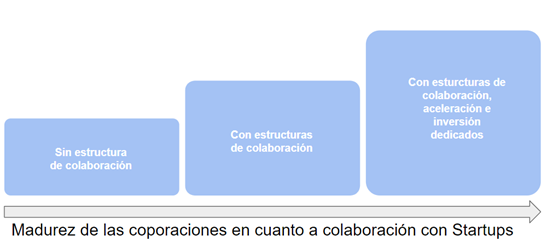HOW TO SELECT THE CORPORATION THAT WORKS BEST? TYPES OF CORPORATIONS
Accelerate your business with these expert tips on "Types of partnerships". Analyse and discover this TIP!
Due to the interest of corporations in seeking solutions to their problems in a changing marketplace and the need to collaborate with startups, Corporations are increasingly designing different types of organisational structures to manage these collaborations.
Depending on the degree of maturity of the organisations dealing with Startups, the collaboration will be more or less complicated and in many cases more or less fruitful for both parties.
We distinguish between 3 types of corporations:
- Companies with no structure at all to manage these partnerships.
- With equipment or area which manages open innovation.
- Companies with dedicated structures to open innovation through acceleration and investment vehicles.

For example, if we start to collaborate with a organisation with little experience collaborating with startups, The process they will probably put us through will be the same as that of any other product or service supplier: references, certifications, very rigid contractual relations, compliance guarantees, presentation to various departments in the organisation, endless internal sales processes, etc.
This lack of flexibility from the organisational side is responsible for failures early on in the relationship, or worse, when both parties have already invested time and resources in trying to understand each other. Moreover, organisations with less maturity in relation to Startups will be less likely to try more disruptive solutions or with greater uncertainty, precisely because they are not prepared to manage that uncertainty or to internally convince their leaders to do so.
As can be deduced, these will be the organisations that pose the most problems for startups during the collaboration, so it is very important to identify them early on to pay special attention when collaborating with them or at least to take them into account during the prioritisation of sales actions.
At the other extreme...
At the other extreme are the corporations that have a very sophisticated system of collaboration with startups.. These organisations even create different relationship vehicles with Startups to adapt to their flexibility and speed in order to work in the most efficient way. Many of them create Innovation Hubs or small Startups, Agile Departments or subsidiary companies to carry out collaborations. This is the case of Wayra (Telefónica), Shuttle (Mercadona), Open Talent (BBVA), etc...
These open innovation vehicles are perfectly designed and collaboration will be much more orderly, however, and unfortunately, Not many corporations are at such a sophisticated level of maturity and those that are, require start-ups to adapt to the structure they have put in place: subscribing to their acceleration programmes, being at a certain stage of maturity, categorisation of opportunities based on business verticals or challenges, etc...
They may sometimes accompany the start-up through investment or even industrial acquisition as part of their strategy.
At a slightly earlier point of maturity are the organisations that have a dedicated Open Innovation department or teams, but which operate in a more flexible and less sophisticated way than the previous oness. These are an excellent choice of corporations to approach, as they combine knowledge and systems of collaboration with startups with less rigidity in selecting and capturing opportunities.
Sometimes these corporations rely on open innovation consultancies to carry out specific recruitment projects: Corporate Acceleration Programmes, Hackatons, ideas competitions, etc... mentorDay collaborates with these types of corporations because we understand that the value they bring to startups is much greater!
CONCLUSIONS
All of the above leaves us with a series of important conclusions that we must take into account when approaching corporations.
The degree to which corporations are prepared to work with startups will have a direct impact on the recruitment phase and the collaboration phase. Making it more or less complex to close collaboration agreements and carry them out. Keep in mind that, sometimes, these barriers are so important that they ruin the collaboration or make it extremely difficult for both parties, making it even unfeasible.
It is therefore extremely important that know the way the corporations you want to approach work. Sometimes you can inquire beforehand, or ask directly, at the initial contact. In this way We will anticipate efforts and be able to adapt our sales process and subsequent collaboration. ¡¡On MentorDay we will only introduce you to corporations that we have selected to help you!
This is not to say that you cannot collaborate with a particular company, but knowing the barriers and risks beforehand will give you a unique opportunity to tailor your pitch.
Are you now clear on the types of corporations that exist?
APPLY THIS TIP TO YOUR PROJECT
TASK
Now that you have read this TIP, answer the following question:
- Search LinkedIn for innovation managers and analyse the maturity level of the corporation in terms of their experience with startups. Write down what you have discovered about each one - get close and practice!
QUIZ
- 💻 PRACTICE with an expert in the next practical webinar.
- 🔎 CONSULT more related TIPs with this same theme.
- 📖 AMPLIA your knowledge by downloading this EBOOK.
THINK ABOUT YOU
- 🚀 IMPULSA your company in the next acceleration programme, ¡book your place now!
- 🥁 PRACTICE with your project in this practical webinar, ¡apply for your place!
- 🌐 CONTACT with other entrepreneurs and companies, ¡register and take part in the next Networking!
THINK ABOUT HELPING OTHERS
- 🤝COLLABORATE as a volunteer: expert, mentor, inverter, awarding, Spreading the word, challenging, innovating, creating a TIP...
- 💬 RECOMMENDS this programme to reach out to more entrepreneurs by Google.
- 👉 SHARE your learning!
- 📲 SEND this TIP 👇









